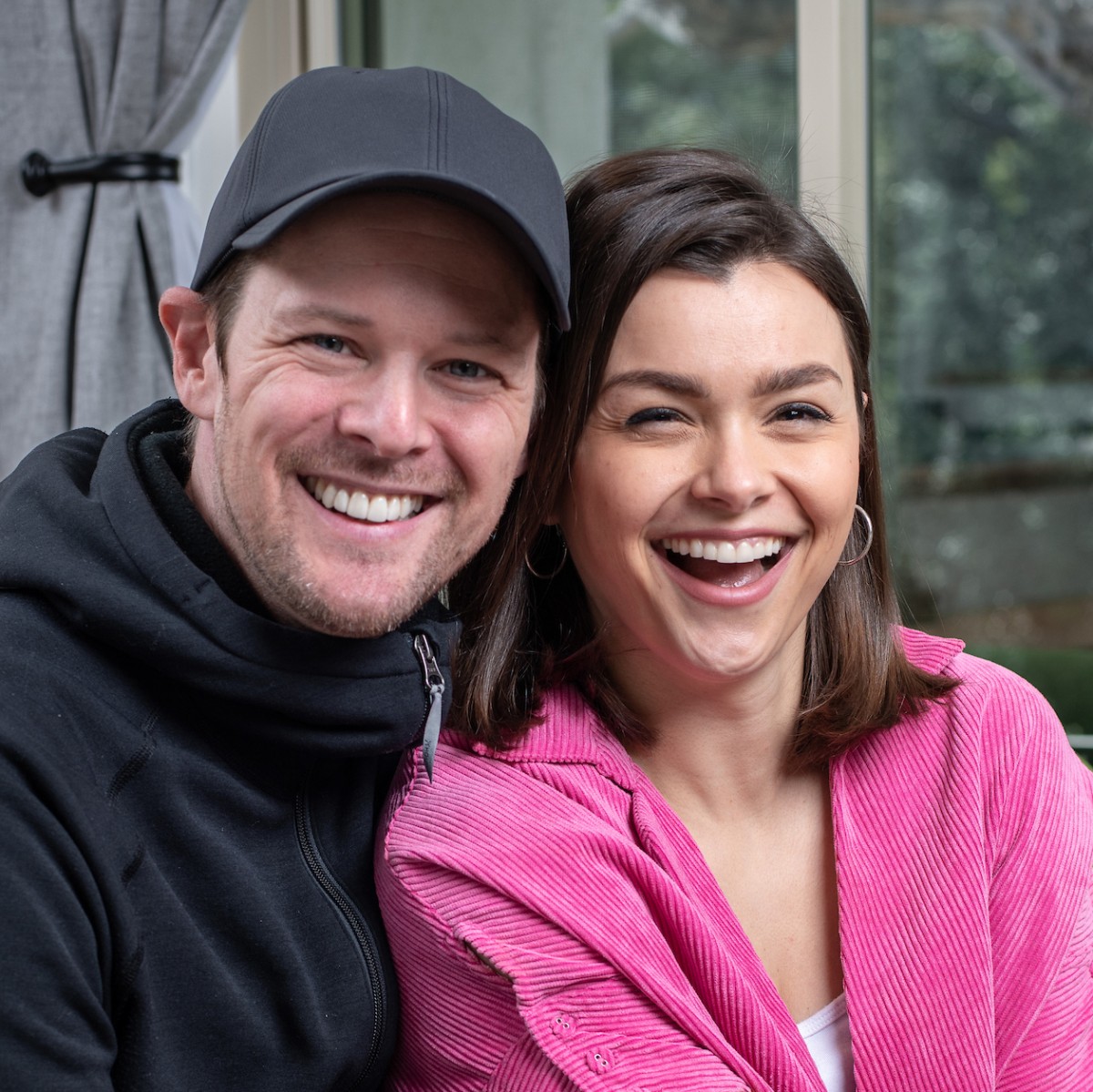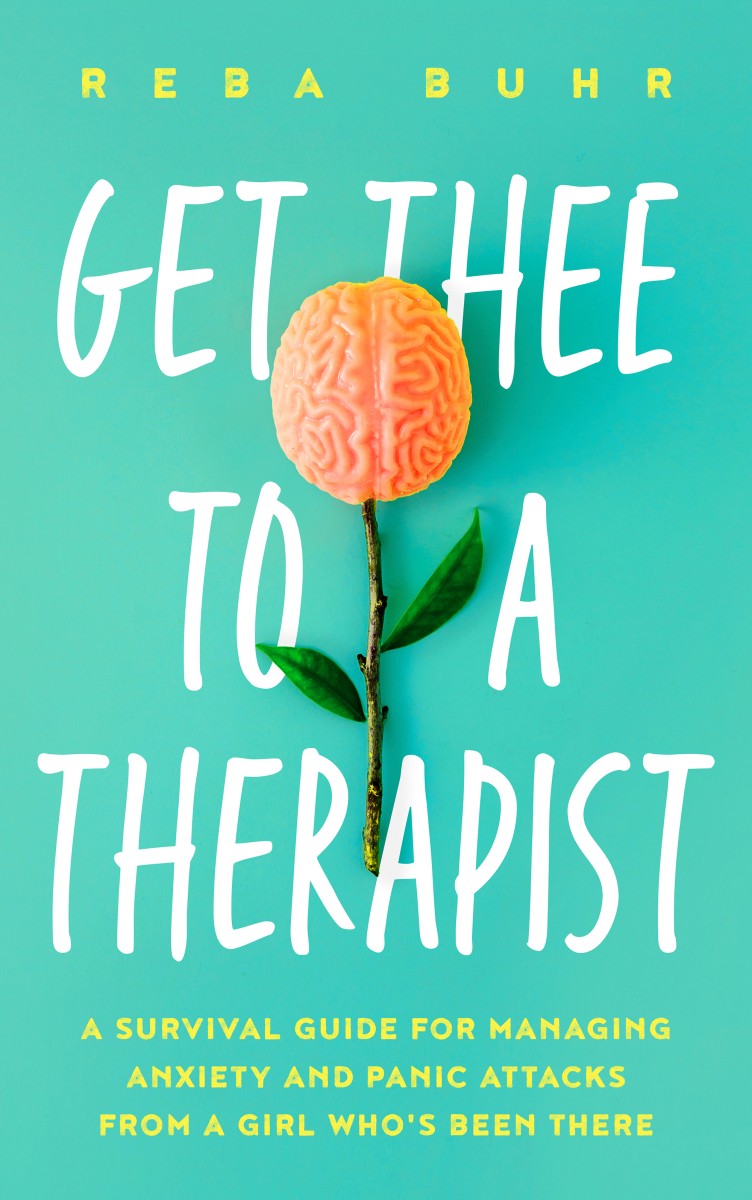Reba Buhr ’10’s Oxy experience was interrupted by the collapse of her mental health. Here’s how she worked through it
It’s October of my junior year at Occidental, and I’m seated in the Dean of Students Office with my dad, crying my eyes out. I’m waiting to speak to Dean Barbara Avery about dropping out of school for the rest of the semester. It’s one of the hardest decisions I’ve faced at that point in my young life, but after two weeks straight of near-constant panic attacks, I can’t eat, sleep, or go to class—and, most upsetting of all to me, I can’t continue to play the lead role of Joan of Arc in Oxy’s fall theater production of George Bernard Shaw’s St. Joan.
Like many college students, I was focused and ambitious. I expected myself to maintain excellent grades. I loved to be involved in clubs and extracurricular activities. I was double majoring in theater and music, which meant that all my spare time outside of class was spent in rehearsals. After that came making new friends and going to parties, never wanting to miss out on any social event. Things like sleep, nutrition, exercise, and relaxation were not on my priority list.
But all that pressure I put on myself to be all things to all people while never checking in with my body is also the reason I eventually snapped.
At the beginning of junior year, I was living off campus with some friends in a house in Mount Washington. As all Angelenos know, September is the hottest month of the year, and I had been sweating all day and drinking little to no water. One evening I decided my first beverage of the day would be some white wine, which quickly went to my head. I felt dizzy and stood up to go to the bathroom, and then I woke up on the floor in a pool of vomit. An ambulance was called to rush me to the emergency room at Glendale Adventist Hospital.
The diagnosis was simple: I had fainted due to extreme dehydration. None of the tests the doctors ran pointed to anything more insidious. They rehydrated my blood with a few bags of saline solution and sent me home.
But I was confused and frightened and, it turns out, traumatized by the experience. I had lost consciousness; my body had failed. Does that mean it can fail again? Do I have no control over whether I’m healthy or ill? Today I understand that I was a new adult, expected to be able to take care of myself but without much training or experience in how to do it well. “The body needs water to live!” But at the time it felt as though the world had suddenly become a much more dangerous place.
The next day started with a quiz in Kinesiology 101. As I sat in that classroom in Fowler Hall filling in answers, I felt a flush of cold over my whole body, immediately followed by a hot sensation. I started to sweat and feel claustrophobic, like the classroom walls were closing in on me. My vision swam, and as my heart began to beat faster and faster, I felt certain that whatever had happened the night before wasn’t just dehydration. I was sick.
I handed in my quiz and ran to the Student Wellness Center. After hearing my symptoms and my fears, the nurse gave me a pill for nausea and sent me back to the emergency room. And as soon as I was back inside Glendale Adventist my symptoms abated. Why? Because I felt safe there, surrounded by doctors and nurses. After another round of tests, they sent me home once again. As I exited the emergency room doors, the panic came flooding back.
After that it was two weeks of fear, elevated heartbeat, loss of appetite, nausea, diarrhea, difficulty sleeping, lightheadedness, worry that I was “going crazy,” and a lot of tears. Finally, a general practitioner in Glendale diagnosed me with panic disorder—the anxiety I now realize I had been living with throughout my adolescence. She prescribed me Xanax to reduce my immediate symptoms and referred me to a psychiatrist and a therapist to create a long-term treatment plan.
People with panic disorder experience frequent panic attacks. A panic attack is the abrupt onset of the body’s “fight or flight” response in reaction to a threat that can’t be dealt with by fighting or running away. Imagine a massive surge of adrenaline that makes your heart pound in your chest, your stomach churn, and your head feel dizzy … all while you’re standing in the canned soup aisle at the grocery store. The panic attacks are so upsetting that sufferers begin to live in fear of them, which leads to having panic attacks about having panic attacks, and the cycle continues.
The doctor’s diagnosis completely surprised me. Due to the stigma around mental illness, I had never heard of an anxiety disorder or a panic attack. That feels unbelievable to me even 15 years later, but people simply didn’t talk about their mental health back then. My parents had even gone through periods where they took antidepressants and saw therapists themselves. But they had never spoken of it to me.
Mental illness is a tough thing to talk about. Those who have never experienced it can easily misunderstand it. So, before you start to paint an image of me in your mind as a shy or timid young woman, allow me to redirect you. I was a confident, outgoing high achiever who loved big responsibilities and actively sought out opportunities to lead. That is what high-functioning anxiety looks like.
According to the Substance Abuse and Mental Health Services Administration (SAMHSA), in 2021 young adults ages 18-25 had the highest prevalence of any mental illness (30.6 percent) compared to adults ages 26-49 (25.3 percent) and aged 50 and older (14.5 percent). Young adulthood is a stressful time, and the numbers have only gotten worse since I was at Oxy. The CDC recently concluded that teen suicide rates increased 60 percent from 2007 to 2018.
With these numbers in mind, it won’t be a surprise that Dean Avery had seen many students like me before. She understood the position I was in. I didn’t want to leave school, but I needed some time to adjust to the new medications I would be taking and to regain a sense of equilibrium. She walked my dad and me through the process of taking “incompletes” in my current courses and applying for a partial tuition refund for the semester. I was assured I could easily return for the spring semester and possibly even graduate on time with the addition of some summer classes.
The sabbatical was a success. The antidepressants were extremely helpful in reducing the frequency and intensity of the panic attacks. I saw my first therapist and began learning about Cognitive Behavioral Therapy and work/life balance. I began meditating, journaling, and exercising, and discovered the correlation between my diet and my brain health. By January, I felt ready to try going back to school.
But I knew my return to Oxy couldn’t simply mean going back to life as usual. If I was going to get through the rest of college with my health intact, I would need to start prioritizing balance over “doing it all.” So, I went back to school with a plan. Despite my FOMO, I wouldn’t audition for the spring musical, Hair. I couldn’t afford the lost sleep from late-night rehearsals. I would take a more reasonable course load to ensure I had time to do homework and have downtime, and I added Tai Chi, Buddhist Meditation Club, and Yoga to my weekly schedule, in addition to therapy off-campus.
I also went back with a mindset shift. My penchant for “sweating the small stuff” was literally making me sick. It was time to learn to be OK with less than perfect grades, to miss out on the occasional social event because I was burned out, and to be my own best friend rather than my worst enemy. Whenever a voice inside my head said, “You’re not good enough,” “Your body isn’t good enough,” or “People don’t like you—you need to earn their love,” I practiced replacing that voice with another one that said, “You are good enough just by virtue of being you.”
My professors were a fantastic source of support. They knew what I had been through and would check in with me regularly, not just on an academic level but on an emotional one. Having so many people to talk to was invaluable. And when a tough day meant I had to pop a Xanax to stave off a panic attack, they didn’t get offended if that led to me dozing through their lecture.
Today, I’m 35 and married (to a fellow Tiger!) and living near Occidental in La Crescenta. I have a fulfilling career as an actress, working primarily in voiceover for animation, videogames, and audiobooks. I am still on medication and still in therapy, but I panic very rarely. I’ve built a lot of tools over the years to help me feel confident in the face of my triggers, and I’ve discovered that therapy is one of the greatest gifts anyone can give themselves regardless of whether they live with mental illness.
My journey with my mental health has been such a profound part of my life, and I wanted to support others in the world who were feeling alone, unsupported, and confused. My book, Get Thee to a Therapist: A Survival Guide for Managing Anxiety and Panic Attacks From a Girl Who’s Been There, which came out last year, is a user manual for young adults with a newly diagnosed mental illness and a lot of practical questions about how to fix it. I also post content on my Instagram account (@get.thee.to.a.therapist) to destigmatize and educate people about accessing mental health services.
It’s time to talk to teens about mental health. Sending them out into the world educated and prepared will be a gift, not a curse. Let them know what depression looks like, what anxiety looks like, OCD, bipolar, disordered eating, addiction, all of it. These conditions are not character flaws. They are illnesses. And when you’re able to identify that there is something wrong, there are professionals to help you.
Today you can find many of those professionals on campus. When I was a student at Oxy there was one on-campus therapist. Today there are five, representing a variety of cultural backgrounds, as well as a staff psychiatrist and a nutritionist. There are also three staff members to support survivors of sexual assault and dating violence. These are exciting changes to see. Our society is finally recognizing that the emotional needs of young people cannot be ignored.
Reba Buhr ’10 is an actress, host, and voiceover artist based in Los Angeles. Get Thee to a Therapist: A Survival Guide for Managing Anxiety and Panic Attacks From a Girl Who’s Been There is her first book.











